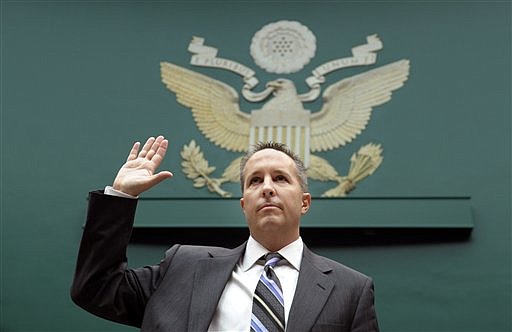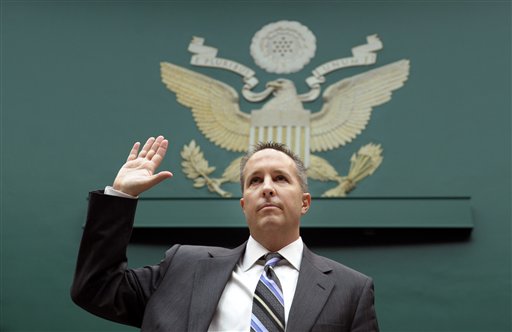WASHINGTON - The head of the Food and Drug Administration asked Congress Wednesday for more authority to police pharmacies like the one that triggered a deadly meningitis outbreak, even as lawmakers questioned why the agency didn't do more with its existing powers.
FDA Commissioner Margaret Hamburg called for new laws to clarify her agency's authority to crack down on companies like the New England Compounding Center, which distributed contaminated pain injections that have sickened more than 460 Americans, causing 32 deaths.
Members of the House Energy and Commerce Committee spent most of the first hearing on the outbreak questioning state and federal regulators about why they didn't act sooner against the company.
A timeline assembled by the committee's Republican staff showed that the FDA and the Massachusetts board of pharmacy investigated the pharmacy more than a dozen times in the past decade. In particular, lawmakers pointed to a 2002 FDA inspection that found contamination issues with the same steroid implicated in the latest recall.
"I was stunned and angered to learn that an inspection of the NECC by the FDA and the Massachusetts board of pharmacy over 10 years ago identified contamination in the very same drug at issue in the current outbreak," said Rep. Fred Upton, R-Mich., who chairs the committee.
Hamburg told lawmakers that the problems uncovered in inspections were "very serious," but that the agency was obligated to defer to Massachusetts authorities, who have more direct oversight over pharmacies.
Hamburg emphasized repeatedly the difficulty of taking action against compounding pharmacies, which have long operated in a legal gray area between state and federal law.
"The challenge we have today is that there is a patchwork of legal authorities that oversee the regulatory actions we can take," said Hamburg, who was nominated to head the FDA by President Obama in 2009.
Compounding pharmacies traditionally fill special orders placed by doctors for individual patients, turning out a small number of customized formulas each week. They are typically overseen by state pharmacy boards.
In the last two decades some compounders, like the NECC, have grown into large businesses that ship thousands of doses of drugs to multiple states. Hamburg said that when her agency tries to intervene in those cases they face a "crazy quilt," of court rulings, which are split on whether the federal government has authority over pharmacies.
Republicans pressed the Hamburg to answer simple "yes or no" questions about the agency's stance, to which she countered with lengthy, nuanced explanations. Lawmakers repeatedly accused the commissioner of evading their questions.
"You're the grand poobah of the FDA and I'm asking you, 'could you have prevented this tragedy?' and you're saying you couldn't have because you don't have jurisdiction," said Rep. Cliff Stearns, R-Fla., in one particularly heated exchange.
"No, I'm saying it's very hard to know if any one action we might have taken would have stopped this terrible tragedy," Hamburg said.
Even some Democrats, who normally side with Obama administration officials during hearings, seemed to lose their patience.
"We have to figure out how to give you the jurisdiction to do what you need to do ... and these inconclusive answers are not helping us," said Rep. Diana DeGette, D- Colo.
In prepared testimony, Hamburg suggested putting in place a two-tier system in which traditional compounding pharmacies continue to be regulated at the state level, but larger pharmacies would be subject to FDA oversight. Hamburg said regulators would have to consider multiple factors, including how much interstate business a pharmacy does, to identify non-traditional compounders.
These non-traditional pharmacies would have to register with the FDA and undergo regular inspections, similar to pharmaceutical manufacturers. Large compounding pharmacies would also have to meet the more stringent manufacturing standards required of pharmaceutical companies.
Earlier in the hearing, the owner and director of the NECC declined to testify, invoking his Fifth Amendment right to not answer questions in order to avoid self-incrimination.
Despite his silence, lawmakers repeatedly pressed Barry Cadden to account for the problems that led to the outbreak.
"Mr. Cadden, what explanation can you give the families who have lost their loved ones, and those who are gravely ill, for the actions of your company?" asked Stearns, who heads the subcommittee on oversight and investigations.
Flanked by two lawyers, Cadden told lawmakers, "Under advice of counsel, I respectfully decline to answer under basis of my constitutional rights and privileges, including the Fifth Amendment."
Federal officials have opened a criminal investigation of Cadden and the NECC.
The Framingham, Mass.-based pharmacy has been closed since early last month, and Massachusetts officials have taken steps to permanently revoke its license.
Inspections last month found a host of potential contaminants at NECC's facility, including standing water, mold and water droplets. Compounded drugs are supposed to be prepared in temperature-controlled clean rooms to maintain sterility.
Cadden appeared immediately after the widow of a longtime Kentucky judge, who died of fungal meningitis after receiving multiple doses of NECC's steroid injection. Fungal meningitis causes inflammation of the lining of the brain and spinal cord.
Speaking without notes, Joyce Lovelace told lawmakers of more than 50 years of marriage to 78-year-old Eddie Lovelace, who was a circuit judge before his death on Sept. 17 at Vanderbilt University Medical Center.
"My family is bitter, we are angry, we are heartbroken and devastated. I come here begging you to do something about the matter," Lovelace said.
Health officials say as many as 14,000 people received the methylprednisolone acetate steroid shots, mostly for back pain. The Centers for Disease Control later showed that at least two lots of the injections distributed to 23 states were contaminated with fungus. The outbreak was first discovered in September, though CDC officials say the deaths connected to the outbreak date back to July.

